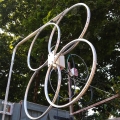jks
About
- Username
- jks
- Joined
- Visits
- 36,235
- Last Active
- Roles
- Member, Administrator, Moderator
- Points
- 639
Reactions
-
v1.387, 388, 389
From the CHANGE_LOG file:v1.388 April 11, 2020 Desktop UI improvements: Added "tuning lock" to right-click popup menu. When active a single-click in waterfall or DX label area will briefly show a "tuning locked" overlay. Should perhaps be extended to include clicks in tuning scale. Does not effect other methods of tuning, e.g. entry in frequency box, click on +/- step buttons. Mobile UI improvements: Double-tap/touch brings up popup menu (same menu as right-click on desktop). Has tuning lock function same as desktop. Two finger pinch-in/out gesture will zoom the waterfall in/out. Tested on iOS & Android. -
Large masked band segments
Paul, VK3KHZ, from PK's Loop Antennas, brought to my attention the http://plonsk.proxy.kiwisdr.com:8073 Kiwi that has these very wide masked band segments (AKA notched, blacklisted).
How was this done? It turns out it's a feature/bug of the existing masked frequency option available with dx labels. Normally when you setup a dx label and set the "type" menu item to "masked" the width of the masked frequency area is the passband of the label's mode (AM, CW, ...) But the dx label panel also contains a "passband" field where you can specify a custom passband which overrides the default.
Well, it turns out you can specify a ridiculously wide passband too. The audio code will clamp an overly wide passband to 12 or 20.25 kHz depending on the Kiwi FPGA configuration, but the masked frequency code will happily take your crazy passband width and block a huge segment of spectrum. So creating a dx label at 1120 kHz with the passband field set to "1180k" would mask the entire NA 530 - 1710 kHz AM BCB (530 = 1120 - 1180/2, 1710 = 1120 + 1180/2). The passband field also accepts a "lo, high" specification (e.g. "300, 2700" for a USB passband). So you could specify a large asymmetrical masked segment as well (label at 6 MHz, passband "-10M, 20M" to get a masked segment from 5 - 8 Mhz). Note the usual 'k' and 'M' suffixes can be used for kHz and MHz respectively.
Rather than specify the middle of the masked range and the width you can also specify the starting frequency and width which might be more convenient. Say you want to mask 26 - 27 MHz. Create a masked label at 26 MHz and set the passband field to "0,1M".
Pretty cool. Thanks Paul! -
Issues running KiwiSDR on subdomains where HSTS is enabled on the main site.
HTTPS on the Kiwi is not happening. Too many implementation/performance problems. We had the barroom-brawl about this years ago. Nothing has changed. Except that I'm less inclined than ever to work on stuff I don't perceive as important/interesting.
Maybe someone else will do this and deliver a 100% tested, validated patch. But history says otherwise. -
KiwiSDR unable to login with SDR.HU [caused by new Comcast/Xfinity "advanced security" feature]
Wow that's a clean VLF/LF/MW spectrum from that 60m dipole. You must have ditched/upgraded all the SMPSs at your place. It's funny to see Jim Creek sitting +20 dB over a flat spectrum. Did you see that you have a beeper with a little bit of frequency wander on 176.65 kHz? I've always wondered if these were leftover LoJack systems before they moved to VHF. Maybe just NFC/ISM stuff? Will never know I suppose. -
KiwiSDR unable to login with SDR.HU [caused by new Comcast/Xfinity "advanced security" feature]





